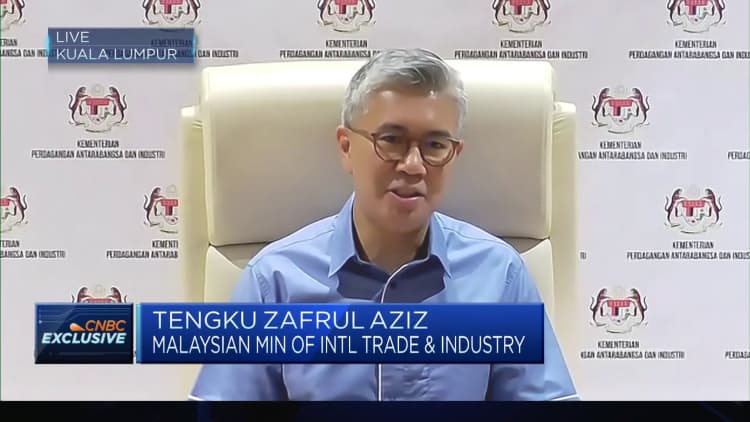These are the countries that will be ‘most hit’ if oil prices reach $100
The surprise output cut by OPEC+ sent oil prices rallying — and analysts say major oil importers like India, Japan and South Korea will feel the most pain if prices hit $100 per barrel.
“It’s a tax on every oil importing economy,” said Pavel Molchanov, managing director of private investment bank Raymond James.
“It’s not the U.S. that would feel the most pain from $100 oil, it would be the countries that have no domestic petroleum resources: Japan, India, Germany, France … to name some of the big examples,” Molchanov said.
Director of Eurasia Group Henning Gloystein said that the regions “most hit” by the oil supply cut and related crude price jumps are those with a high degree of import reliance and a high share of fossil fuels in their primary energy systems.
“That means the most exposed are import reliant emerging market industries, especially in South and Southeast Asia, as well as the super-import dependent heavy industries of Japan and South Korea.”
— Lee Ying Shan
India holds repo rates at 6.5% in surprise move to pause
India’s central bank has held its repurchase rate at 6.5%, marking the first time since April 2022, when the Reserve Bank of India started its monetary tightening cycle.
The repurchase rate, or repo rate, is the rate at which the Reserve Bank of India lends money to commercial banks or financial institutions in India against government securities.
This was expected only by a minority of economists, with only 13 out of 60 economists polled by Reuters forecasting a pause in rates. The remainder all expected a hike of 25 basis points.
The Indian rupee weakened 0.15% to 82.04 against the U.S. dollar following the announcement.
The worst is over for inflation in India, says Nomura
The worst is over for inflation in India, and both core and headline inflation are expected to fall in the coming months, said Sonal Varma, Nomura’s chief economist for India and Asia outside of Japan.
The financial services firm’s forecast right now for both headline and core is in the 5.5 to 6% range, Varma said. And going forward between April and March 2024, it expects inflation “will be closer to 5% rather than even greater than 5.5%.”
“The key to monitor for [inflation in] India is food and monsoon related risks, but other than that, I think things are getting back in check and the worst of inflation is behind us.”
Nomura also forecasts the Reserve Bank of India could hit pause on raising interest rates, instead of hiking by 25 basis points like most analysts polled by Reuters expect.
India’s central bank has hiked interest rates by 250 basis points since May 2022, and “plus liquidity tightening, the cumulative effect of hike is actually more than 300 basis points already,” Varma told CNBC’s Street Signs Asia on Thursday.
— Charmaine Jacob
Gold reaches highest level since October 2020 as recession risks rise
Gold prices remained above $2,000 for a third straight day as investors see increasing risks of a recession, especially with U.S. job growth slowing.
The yellow metal traded at $2,011.54 per ounce on Thursday, after having breached the $2,000 mark on Tuesday to reach its highest level since October 2020.
China is our largest trading partner and continues to be: Malaysia minister

China is Malaysia’s largest trading partner and continues to be, a Malaysian minister told CNBC in an exclusive interview.
“China continues to be Malaysia’s largest trading partner for 14 consecutive years and China has always been the largest foreign investor into China,” said Tengku Zafrul Aziz, minister of international trade and industry, on CNBC’s “Squawk Box Asia” on Thursday.
His comments come as tensions between the U.S. and China have been rising over the years, ranging from trade sanctions to tech rivalry.
“But having said that, the top two investors and trading partners of Malaysia are both China and the U.S.,” said the minister, adding that Malaysia had good discussions with investors and companies from both nations.
Malaysia’s prime minister Anwar Ibrahim said that the country has agreed to strengthen and elevate bilateral relations with China, according to a press release.
On Tuesday, he said that China has committed to pump 170.07 billion Malaysian ringgit ($38.6 billion) into Malaysia, such as the petrochemical and automotive industries.
— Sheila Chiang
CNBC Pro: UBS names 6 ‘high-quality’ global dividend stocks with more than 5% yield
UBS has named several high-quality dividend-paying stocks with solid earnings that are unlikely to cut their dividends.
The stock picks include companies from different regions and sectors, which were selected using quantitative models and further scrutinized by UBS sector analysts.
CNBC Pro subscribers can see the stock picks here.
— Ganesh Rao
Australia’s February trade balance expands to $9.25 billion
Australia’s trade balance in February has expanded to AU$13.84 billion ($9.25 billion), up from the AU$11.69 billion recorded in in January.
This was also above economists expectations that the trade balance will fall to AU$ 11.1 billion.
Australia’s goods and services imports in February fell by 9% year-on-year, while exports inched down by 3%.
— Lim Hui Jie
China’s services activity in March picks up pace on new orders
China’s service sector activity continued to expand in March, according to the latest Caixin services purchasing managers’ index that rose to 57.8.
The reading marks the fourth month of acceleration and above the 50-point mark that separates growth from contraction.
It also reached the highest reading since November 2020. The increase in activity was supported by a sustained and sharper rise in new business, Caixin said in its release.
– Jihye Lee
Oil slips after Saudi Arabia reportedly raises May Arab Light crude prices in Asia
Oil prices fell after Saudi Arabia raised the prices for its flagship crude for Asian buyers for the third straight month, Reuters reported.
The comes after prices jumped the most in nearly a year after OPEC’s surprise output cut over the weekend.
Brent Crude futures fell 0.68% to $84.33 a barrel and West Texas Intermediate crude inched 0.66% lower to $80.08 a barrel.
– Jihye Lee
Foxconn posts better sales for first quarter, but less optimistic on outlook
Electronics contract manufacturer Foxconn reported better sales for the first quarter of 2023, but was less bullish in its outlook for the second quarter.
Foxconn, which is also known as Hon Hai Precision Industry, recorded revenue of NT$1.46 trillion ($48 billion) for the first quarter of 2023, up 3.87% year-on-year.
However, the company said its outlook for the second quarter will be weaker due to two factors.
These are the seasonal off-peak period as new and old products transition, as well as a high base “from an unseasonally strong pull-in in the first half of last year,” Foxconn said.
Foxconn was also recently in the news after its founder Terry Gou announced his intention to run for Taiwan’s presidency.
India expected to raise repo rates by 25 points to 6.75%
India’s central bank is expected to raise its repurchase rate from 6.5% to 6.75%, making this its eighth straight increase.
According to a Reuters poll of 60 economists, 47 are expecting a rate hike, while the remainder expect a pause.
The repurchase rate, or repo rate, is the rate at which the Reserve Bank of India lends money to commercial banks or financial institutions in India against government securities.
The country held its repo rate at a five year low of 4% in May 2020, until it initiated hikes in April 2022.
— Lim Hui Jie
Chip stocks fall as recession fears mount
CNBC Pro: The banking panic has created this pocket of opportunity with yields nearing 8%, according to analysts
Recent banking turmoil in the U.S. and Europe has been a source of panic, but analysts are pointing to a pocket of opportunity.
Investors can enjoy high yields in this type of investment, some are at highs and hovering at nearly 8%.
CNBC Pro subscribers can read more here.
— Weizhen Tan
Services index slides on drops in orders, imports and prices
The U.S. services sector slipped closer to contraction in March due to sharp declines in new orders, exports and prices.
The ISM Services index declined to 51.2%, representing the level of businesses reporting expansion. A reading below 50% represents contraction, a level that index last saw in December. Economists had been looking for 53.8%, according to Dow Jones. February’s reading was 55.1%.
New export orders plunged 18 percentage points to 43.7, new orders tumbled 10.4 points to 52.2 and imports fell 9 points to 43.6. The prices sub-index showed inflation cooling some, as it dropped 6.1 percentage points to 59.5.
The ISM Manufacturing index is well in contraction level, with a reading Tuesday of 46.3% for March.
—Jeff Cox
U.S. trade deficit rises, pointing to weaker Q1 growth
The U.S. trade deficit rose more than expected in February as exports posted a sharp decline, the Commerce Department reported Wednesday.
The trade imbalance increased to $70.5 billion for the month, up $1.9 billion from January and more than the Dow Jones estimate.
Exports fell to $251.2 billion, a 2.7% decline, as industrial supplies, autos, consumer goods and capital goods all decreased. Imports fell by $5 billion.
As exports add to GDP and imports subtract, the numbers suggest economic growth could be weaker than expected in the first quarter. The Atlanta Federal Reserve’s GDPNow tracker is pointing to a gain of just 1.7% for the period, down from 3.5% less than two weeks ago.
—Jeff Cox
CNBC Pro: Market veteran says we may be ‘a long way from a new bull market’ and shares what to buy and avoid
A strong first quarter for stocks has raised hopes of a new bull market. But David Dietze, managing principal at Peapack Private Wealth Management, says that could be wrong and inflation is still the biggest headwind.
He added that investors should remain invested in the stock market.
Pro subscribers can read more here.
— Zavier Ong
Yields dip after ADP report misses expectations
Treasury yields gave up their gains and turned red for the day after a weak labor market reading from the ADP private payrolls report.
The 2-year Treasury yield fell 8 basis points to 3.751%. The 10-year yield fell more than 3 basis points to about 3.3%.
Yields move opposite of price.
— Jesse Pound
Hiring slumps in March as financial activities sector sees big decline
Private company hiring fell sharply in March and was well below expectations, according to a report from payroll processing firm ADP.
Payrolls rose by just 145,000 for the month, down from 261,000 in February and below the Dow Jones estimate for 210,000.
Losses in financial activities, profession and business services and manufacturing pushed the total lower. Leisure and hospitality, trade, transportation and utilities and construction led hiring.
The numbers come ahead of Friday’s nonfarm payrolls report, which is expected to show a gain of 238,000.
—Jeff Cox
Read the full article here










